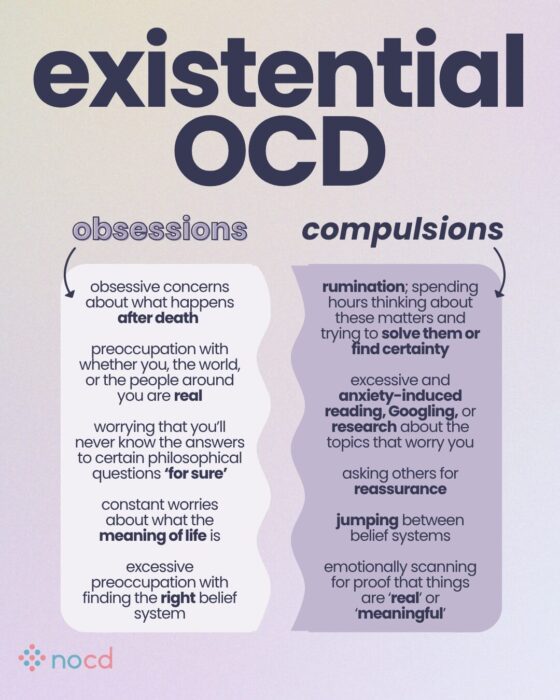Existential OCD is a subtype of obsessive-compulsive disorder (OCD) where a person becomes fixated on life’s biggest questions—like Why are we here? or What if nothing is real? These thoughts aren’t harmless curiosity. They’re intrusive, distressing, and often lead to compulsive behaviors aimed at finding certainty.
According to research, 29.6% of people with OCD experience intrusive thoughts about philosophical, impossible-to-answer questions about their purpose or life after death.
Keep reading to learn more about the signs and symptoms of existential OCD, and how to get help.
What is existential OCD?
Existential OCD is a subtype of obsessive-compulsive disorder in which a person obsesses over unanswerable, abstract, or philosophical questions—often about life’s purpose, reality, death, or the nature of the universe. These thoughts go far beyond casual wondering. They cause significant anxiety, doubt, and distress, and often lead to compulsions aimed at finding certainty or relief.
What are the common existential OCD obsessions?
People with existential OCD may become stuck on questions such as:
- What if I’m not really here? How would I know?
- What if my whole life is a simulation and nothing around me is real?
- If I don’t actually exist, does anything I do matter?
- What if life has no meaning?
- What if our existence is just an accident?
- What happens after death, and how can I be sure?
While many people ponder these ideas occasionally, those with existential OCD feel compelled to answer them. When no definitive answer comes, distress intensifies.
What are the common compulsions in existential OCD?
To reduce their anxiety or prevent a feared outcome, people with existential OCD often engage in compulsions, such as:
- Excessive research: Spending hours searching online, reading philosophy, or watching videos to find a definitive answer
- Seeking reassurance: Asking others if they are real, if you are real, or if life has meaning
- Mental reviewing: Replaying past experiences to try to “prove” reality or existence
- Testing reality: Engaging in actions to confirm you exist, such as checking your reflection in the mirror
- Thought neutralization: Trying to counter obsessive thoughts with logic or self-reassurance
While these compulsions may seem to offer relief in the moment, they only make distress worse over time.
How is existential OCD different from normal curiosity?
The key difference is distress and impairment. Healthy philosophical curiosity feels open-ended and thought-provoking.
In contrast, existential OCD leads to:
- Intrusive, looping questions you can’t ignore
- Urges to seek answers immediately
- A need for certainty about unknowable topics
- Anxiety, detachment, or fear when questions go unanswered
- Difficulty focusing on daily tasks
In short: these thoughts aren’t harmless—they’re obsessions that disrupt life.
How is existential ocd treated?
The most effective treatment for existential OCD—and all subtypes—is exposure and response prevention (ERP) therapy. ERP is a specialized form of cognitive behavioral therapy (CBT) proven to be effective for OCD. General CBT, if not tailored for OCD, can sometimes be unhelpful or even worsen symptoms.
Here’s how it works:
- Exposure: You intentionally face triggering thoughts or situations, such as reading a quote about death or watching a movie that sparks existential dread.
- Response prevention: You resist the urge to engage in compulsions, such as reassurance seeking or mental reviewing.
Over time, this process helps retrain the brain to tolerate uncertainty without panic or compulsive behavior.
Studies show that ERP therapy is highly effective, with 80% of people with OCD experiencing a significant reduction in their symptoms.
Other approaches may help include:
- Medication (typically SSRIs)
- Mindfulness-based strategies
- Acceptance and commitment therapy (ACT)
These are typically done in combination with ERP therapy, depending on the individual’s needs.
Severe or treatment-resistant existential OCD may benefit from the following therapies:
- Intensive outpatient programs (IOPs)
- Partial hospital programs (PHPs)
- Residential treatment centers (RTCs)
- Transcranial magnetic stimulation (TMS)
- Deep brain stimulation (DBS)
- Gamma knife radiosurgery (GKRS)
Find the right OCD therapist for you
All our therapists are licensed and trained in exposure and response prevention therapy (ERP), the gold standard treatment for OCD.
What if I can’t stop thinking about these questions?
The goal of treatment isn’t to erase the thoughts—it’s to change your relationship with them.
ERP helps people learn that:
- These thoughts don’t require answers
- Uncertainty about life’s big questions is okay
- You can have disturbing thoughts without doing anything about them
- Obsessions don’t define your values or beliefs
With support from a trained OCD specialist, many people learn to coexist with these thoughts without fear or compulsion.
Bottom line
Existential OCD involves intrusive, distressing questions about life, death, and reality—but these thoughts aren’t just “deep thinking.” They’re symptoms of OCD that can be treated. With ERP therapy and, in some cases, medication and other complementary approaches, people can learn to live with uncertainty, reduce compulsions, and reclaim their peace of mind.
Key takeaways
- Existential OCD causes intrusive, distressing questions about life, death, and reality that feel urgent to answer.
- It’s different from normal curiosity because the uncertainty feels intolerable and disrupts daily life.
- Common compulsions include reassurance seeking, endless research, mental review, avoidance, and thought suppression.
- Effective treatments are available, including exposure and response prevention (ERP) therapy, medication, and other supportive approaches tailored to your needs.


